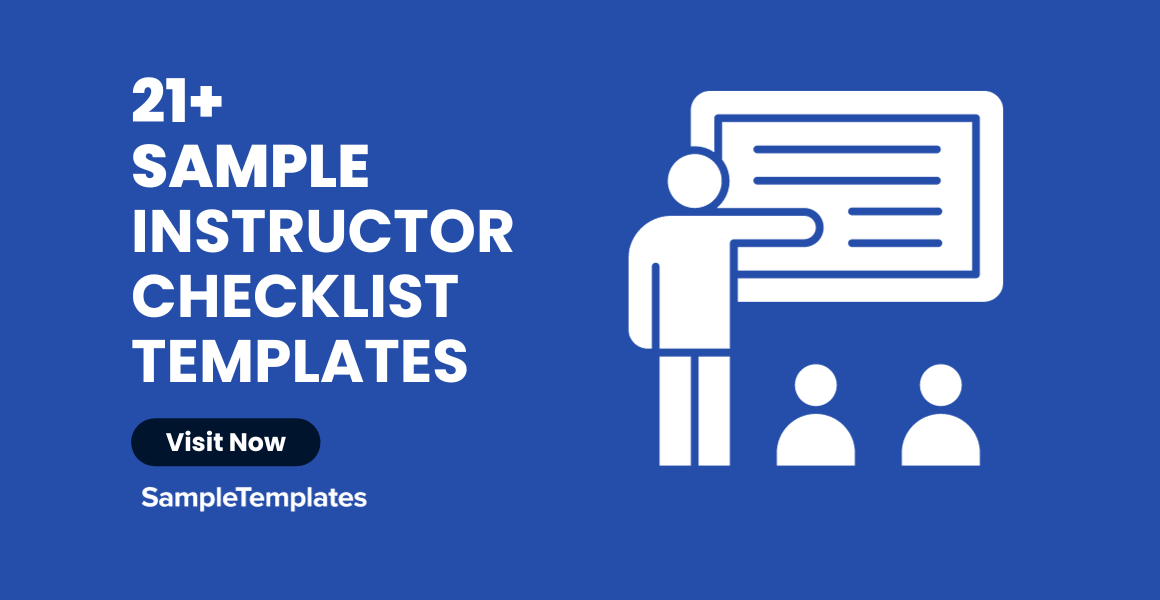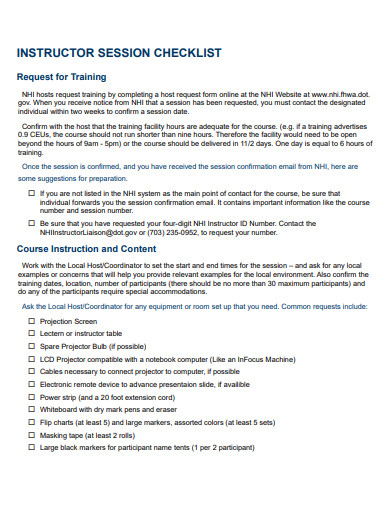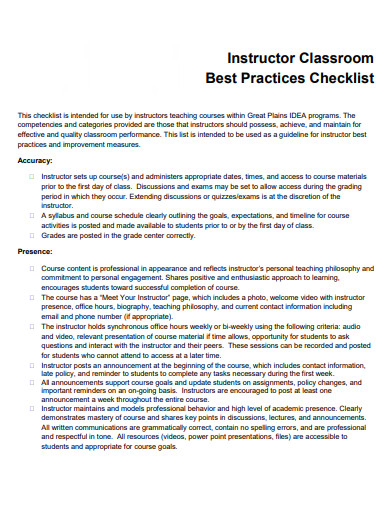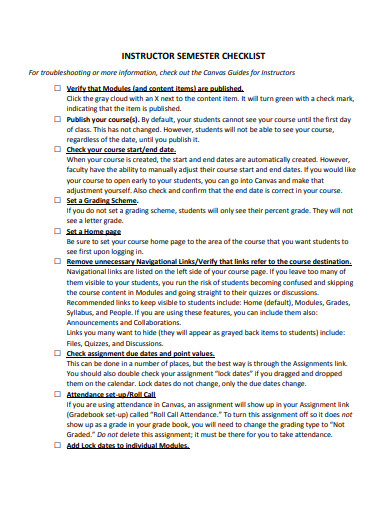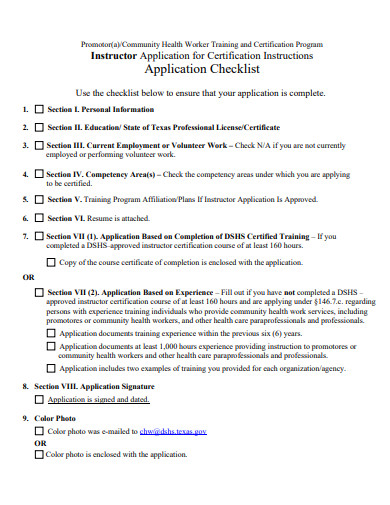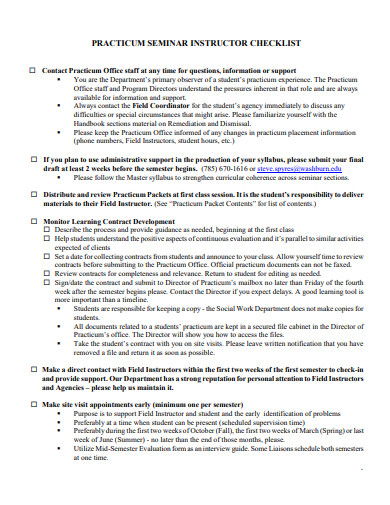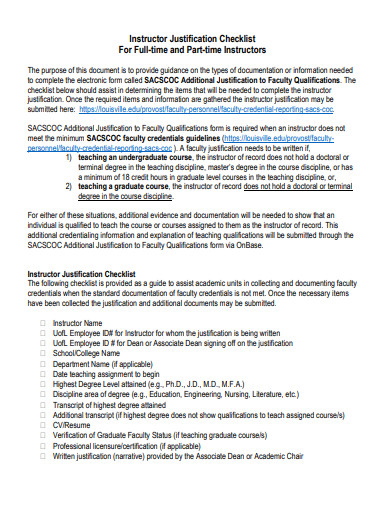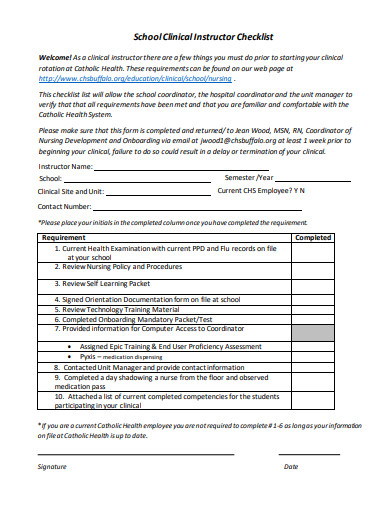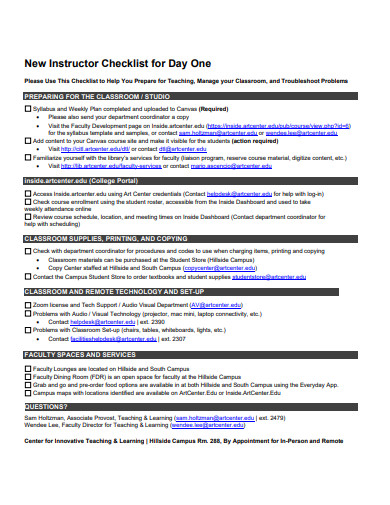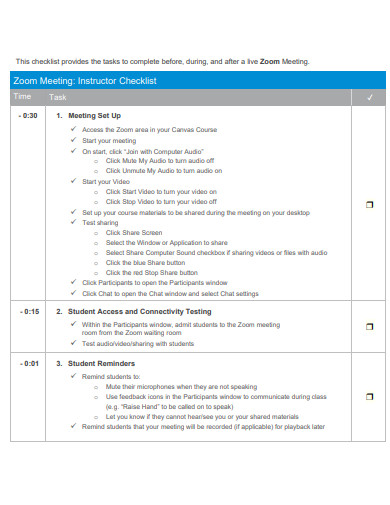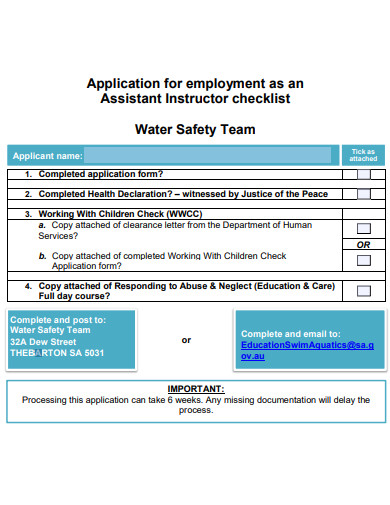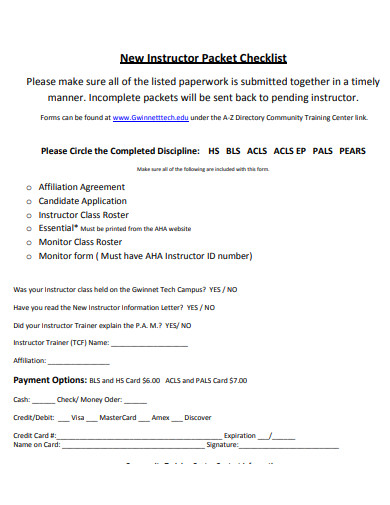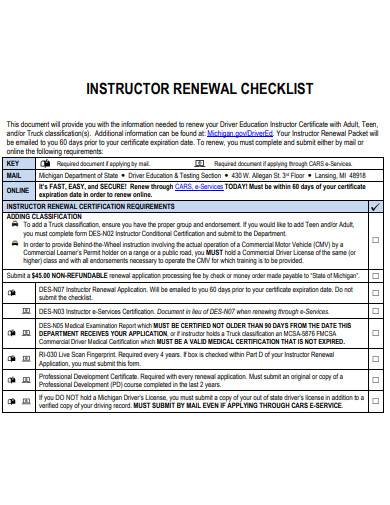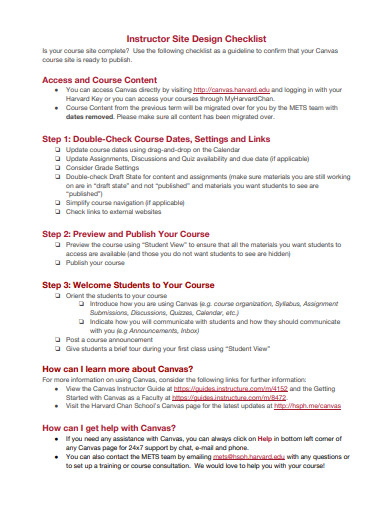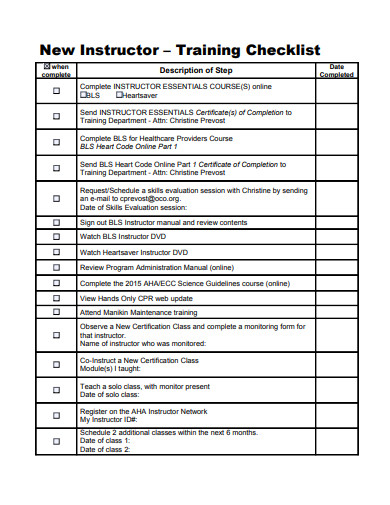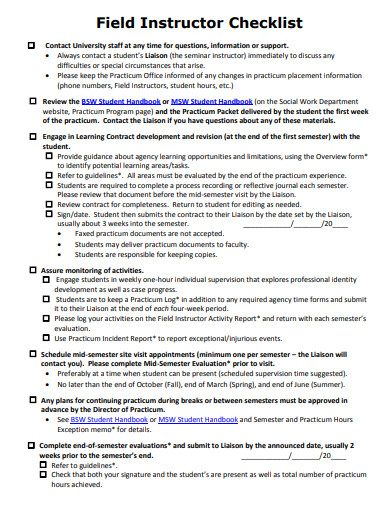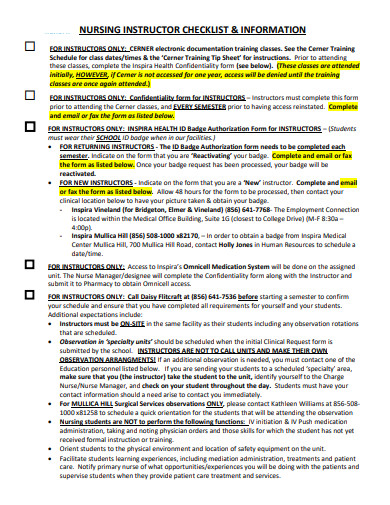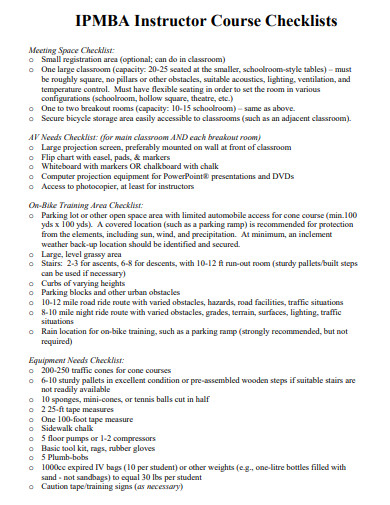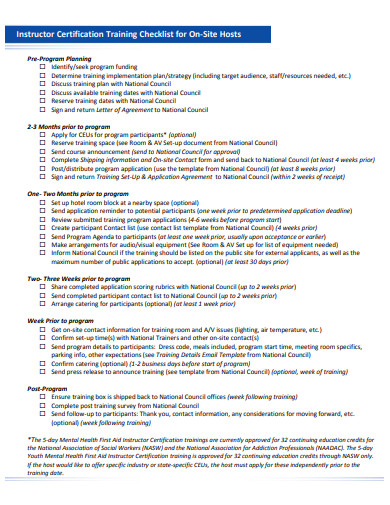Every successful instructor knows that preparation is key. The ‘Instructor Checklist’ is an essential tool, ensuring educators are fully equipped and ready to deliver outstanding lessons. Whether you’re a seasoned teacher or just starting out, this sample checklist covers all bases, integrating crucial keywords and best practices. It’s tailored for the modern educational landscape, offering a comprehensive guide to elevate your teaching game. Don’t leave it to chance; ensure every class is a masterclass.
21+ Instructor Checklist Samples
1. Sample Checklist Template
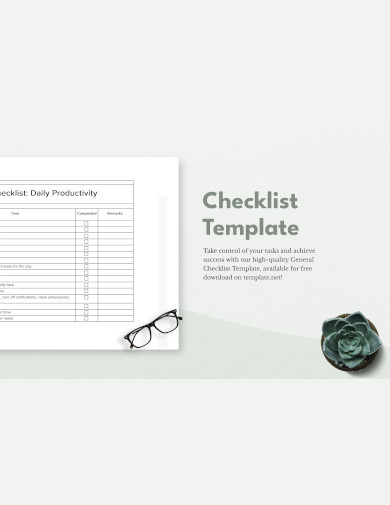
2. Basic Checklist Template
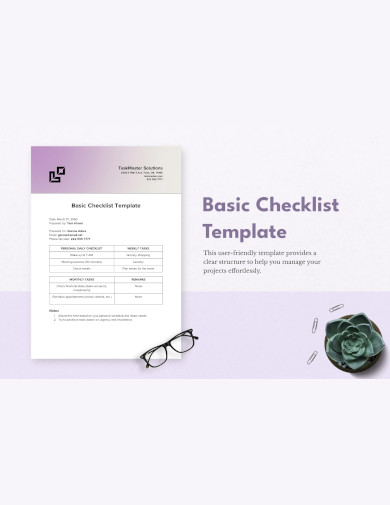
3. Formal Checklist Template
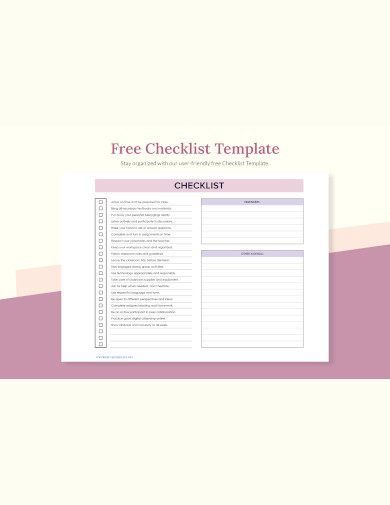
4. Printable Checklist Template
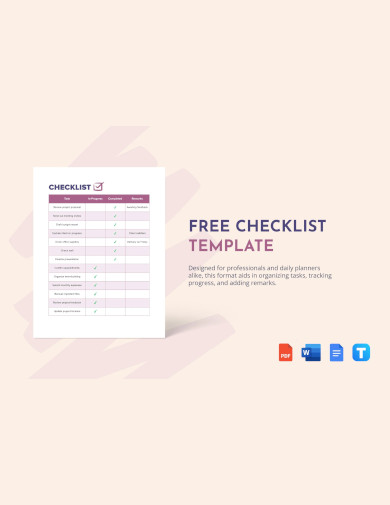
5. Instructor Session Checklist Template
What is an Instructor Checklist?
An instructor checklist serves as a crucial tool for educators and trainers, offering a structured and systematic approach to ensure the successful delivery of a course or training session. In the dynamic world of education, where variables can shift and challenges can arise unexpectedly, this printable checklist can act as both a guideline and a safety net, ensuring nothing essential is overlooked.
Purpose and Importance
The primary purpose of an instructor checklist is to guarantee that educators are well-prepared and that all elements required for effective teaching are in place. This encompasses everything from logistical arrangements to pedagogical considerations. Here’s why they are indispensable:
- Efficiency: With a clear sample list of tasks and preparations, instructors can save time and energy by avoiding repeated checks or last-minute scrambles.
- Consistency: It ensures that all sessions, regardless of when or where they’re held, provide a uniform learning experience.
- Quality Assurance: A comprehensive checklist aids in maintaining the standard of the course or training, ensuring that learners get the best possible experience.
- Confidence Boost: Knowing that everything is in order boosts the instructor’s confidence, allowing them to focus solely on delivering content.
Common Components
While the specifics of an instructor checklist can vary based on the course or training type, certain universal components are generally included:
- Course Materials: A list of necessary textbooks, sample handouts, slide decks, and other instructional materials.
- Equipment and Technology: Details about required tech tools, like projectors, computers, and software, as well as their operational checks.
- Venue Preparation: Ensuring the training room is set up correctly, considering factors like seating arrangements, lighting, and accessibility.
- Administrative Details: This could include taking attendance, having a class roster, knowing emergency procedures, and understanding any specific institution or organization sample policies.
- Learning Objectives: A clear outline of what students or participants should know or be able to do by the end of the session.
- Feedback and Evaluation: Instruments or methods, such as surveys or questionnaires, to gather feedback about the session’s effectiveness.
Adapting and Evolving
While a checklist provides a structure, it’s essential to remember that teaching and training are dynamic processes. An instructor should feel empowered to adapt their checklist to the unique needs and challenges of their specific context. Regularly revisiting and updating the checklist in response to sample feedback and experience ensures that it remains a relevant and useful tool in the instructor’s arsenal.
Types of Instructor Checklist
Instructor checklists can vary based on the nature of the instruction, the environment, the audience, and the subject being taught. Here are some common types of instructor checklists:
- School Teacher Checklist: Used by primary and secondary school teachers, covering lesson plans, classroom management, and student-specific needs.
- University Professor Checklist: Geared towards higher education, focusing on lecture preparation, research materials, grading criteria, and potentially graduate student supervision.
- Online Instructor Checklist: For educators teaching in virtual environments, covering technical requirements, digital resources, platform familiarity, and student engagement techniques online.
- Training Workshop Checklist: Used by trainers in corporate or organizational settings, focusing on specific training objectives, hands-on activities, and participant engagement.
- Physical Education Instructor Checklist: For gym teachers or sports coaches, emphasizing equipment checks, safety measures, exercise plans, and skill development activities.
- Art & Music Instructor Checklist: Tailored for creative teaching environments, detailing art supplies or musical instruments, lesson structures, and performance evaluations.
- Special Education Instructor Checklist: For educators working with students with special needs, ensuring accommodations, individualized education sample plans (IEPs), and specialized teaching aids are in place.
- Lab Instructor Checklist: Used in science and technology courses that involve lab work, highlighting safety protocols, equipment checks, experiment setups, and clean-up procedures.
- Field Trip or Outdoor Education Instructor Checklist: For off-site learning experiences, detailing transportation, permissions, safety measures, site-specific activities, and equipment.
- Language & ESL (English as a Second Language) Instructor Checklist: Designed for language teaching, encompassing vocabulary lists, grammar exercises, cultural nuances, and interactive speaking activities.
- Driving Instructor Checklist: For those teaching driving skills, emphasizing vehicle checks, safety protocols, driving routes, and evaluation criteria.
- Technical & Vocational Training Checklist: Used in institutions teaching specific trades or skills, covering equipment, hands-on training procedures, and safety measures.
6. Instructor Classroom Checklist Template
7. Instructor Semester Checklist Template
8. Instructor Application Checklist Template
9. Practicum Seminar Instructor Checklist Template
10. Instructor Justification Checklist Template
11. School Clinical Instructor Checklist Template
12. New Instructor Checklist Template
13. Zoom Meeting Instructor Checklist Template
14. Assistant Instructor Checklist Template
15. New Instructor Packet Checklist Template
16. Instructor Renewal Checklist Template
17. Instructor Site Design Checklist Template
18. New Instructor Training Checklist Template
19. Field Instructor Checklist Template
20. Nursing Instructor Checklist Template
21. Instructor Course Checklist Template
22. Instructor Certification Training Checklist Template
Why is an Instructor Checklist Vital?
- Organization: Keeping track of multiple tasks can be daunting. A checklist streamlines this process, offering a visual representation of what needs to be done.
- Consistency: To offer students a uniform experience, instructors need to maintain consistency across sessions. A checklist ensures that nothing is missed out.
- Efficiency: By having a clear list, educators can avoid repeated checks and last-minute preparations, making their sessions more time-efficient.
How do you Create an Instructor Checklist?
Instructors, whether they’re teaching in traditional classrooms or online platforms, have multiple responsibilities to juggle. From ensuring that course materials are up-to-date to fostering an engaging learning environment, the responsibilities are endless. Creating an instructor checklist can be the key to organizing these tasks and ensuring that the learning experience is smooth for both the teacher and the students. You can also see more on Candidate Checklists. Here’s a guide to creating a comprehensive instructor checklist:
1. Establish Clear Learning Objectives:
Start by determining what you want your students to learn by the end of the course. These objectives will serve as your compass, guiding your teaching methods and assessment strategies. For instance, if you’re teaching a course on digital marketing, objectives might include understanding the basics of SEO, creating effective online ad campaigns, and analyzing sample website traffic.
2. Organize Course Materials:
With your objectives in mind, compile and organize your teaching materials. This includes textbooks, lecture slides, multimedia resources, and supplementary readings. Ensure that all materials are current and relevant. For a digital marketing course, you might need up-to-date statistics, case studies of recent campaigns, and access to online tools like Google Analytics.
3. Plan Interactive Activities:
Engagement is crucial for effective learning. Intersperse your lectures with activities that require students’ active participation. This could be group discussions, hands-on projects, or quizzes. For our digital marketing example, you might organize a project where students design their own marketing campaign, or hold debates on the pros and cons of different advertising strategies.
4. Incorporate Assessment Methods:
Determine how you will evaluate students’ understanding and progress. This can include assignments, tests, projects, and class participation. Make sure your assessments align with your learning objectives. For the digital marketing course, an sample assessment could involve students analyzing the traffic of a live website or creating a mock marketing campaign.
5. Include Feedback and Reflection:
No checklist is complete without a step dedicated to feedback. Create mechanisms through which students can share their experiences, concerns, and suggestions. This can be through one-on-one meetings, anonymous feedback forms, or class discussions. Also, set aside time for self-reflection. Assess what’s working in your teaching strategy sample and what isn’t, and adjust accordingly. After a major project in the digital marketing course, you might ask students to reflect on what they’ve learned, what challenges they faced, and how they overcame them.
In Conclusion, An instructor checklist, while seemingly simple, is an embodiment of an educator’s dedication to their craft. It reflects the foresight, preparation, and attention to detail required to deliver an impactful learning experience. By adhering to such a checklist, instructors not only ensure a smooth flow of their sessions but also enhance the overall learning environment for their students.
Related Posts
FREE 17+ Survey Checklist Samples in MS Word | Google Docs | PDF
FREE 18+ Internship Checklist Samples in MS Word | Google Docs | PDF
FREE 18+ Statement Checklist Samples in MS Word | Google Sheets | PDF
FREE 20+ Voluntary Checklist Samples in MS Word | Google Sheets | PDF
FREE 18+ Summary Checklist Samples in MS Word | Google Sheets | PDF
FREE 14+ Sponsorship Checklist Samples in MS Word | MS Excel | PDF
FREE 18+ Conference Checklist Samples in MS Word | Google Sheets | PDF
FREE 17+ Lesson Checklist Samples in MS Word | Google Sheets | PDF
FREE 18+ Progress Checklist Samples in MS Word | Google Docs | PDF
FREE 18+ Enrollment Checklist Samples in MS Word | Google Docs | PDF
FREE 18+ Graduation Checklist Samples in MS Word | Google Sheets | PDF
FREE 15+ Consent Checklist Samples in MS Word | Google Sheets | PDF
FREE 18+ Review Checklist Samples in MS Word | Apple Pages | PDF
FREE 18+ Submission Checklist Samples in MS Word | Google Docs | PDF
FREE 18+ Request Checklist Samples in MS Word | MS Excel | PDF
